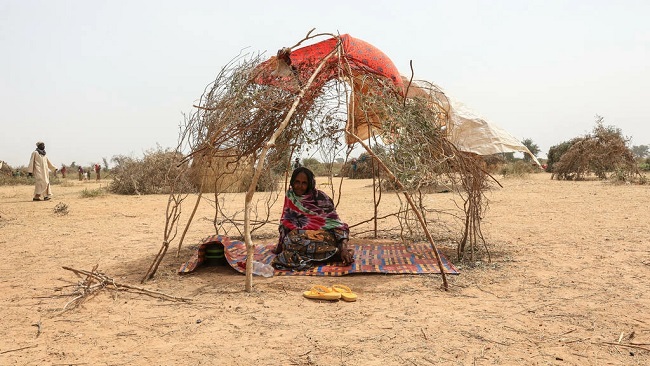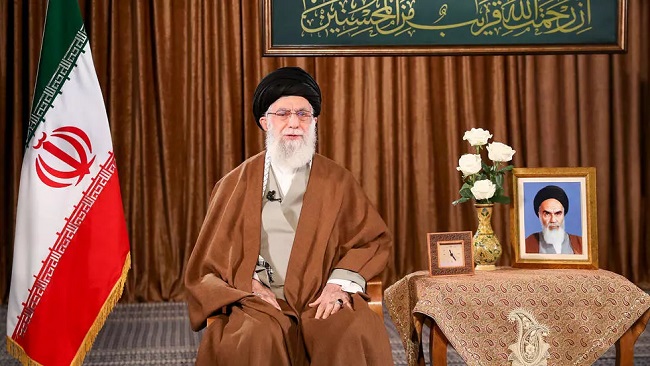2, March 2022
In French Cameroun’s arid north, climate stress boosts ethnic strife 0
Their homes are a scattering of huts made of branches and dry leaves that seem to almost dissolve into the arid landscape.
A group of men sit on a rug, conversing in the shade of a tree, while women perching on stones under the scorching Sahel sun prepare a meal with the few ingredients they have to hand, as children play nearby.
These are some of the 4,000 ethnic Arabs in a makeshift camp at Bogo in Cameroon’s Far North region.
They fled after violence erupted near Kousseri, a river town about 100 kilometres (60 miles) from Lake Chad.
The fighting flared in August, then again in December, pitting Choa Arab herders against Mousgoum fishermen in a fight over access to water, a precious but dwindling resource in this region.
The Mousgoum dig pools to capture water and keep fish — a practice that often causes friction with Arab herders seeking water points for cattle, but which this time spiralled out of control.
At least 67 people died and hundreds were injured, the town’s cattle market was destroyed and around 100,000 people fled.
Many crossed into neighbouring Chad or headed towards Maroua, the Far North’s capital, lying more than 800 kilometres (500 miles) northeast of the capital Yaounde.
Mahamat Sale, 60, is the leader of the group in Bogo, who say they walked some 175 kilometres (110 miles) to reach a place they consider safe. They have lost everything.
“We prefer to stay here rather than go back,” said Sale. “Here, we are tolerated. Over there, the Mousgoums consider us to be invaders.”
Climate stress
Rising temperatures and scarcer, more unpredictable rainfall are acknowledged factors in inflaming ancestral tensions in the Lake Chad area.
In a 2019 report, the Europe-based think tank Adelphi warned of “a feedback loop” — a vicious circle, in non-technical speech — between climate change and conflict dynamics.
Climate stress increases pressure on communities, which undermines their ability to cope.
This in turn makes those communities more vulnerable to climate impacts and heightens competition for resources.
Armel Sambo, a professor of history at the University of Maroua, said “When the economic situation deteriorates, people fall back on their ethnicity, religion and identity issues,” inflaming the risk of violence.
“Historically, the Mousgoums are the natives and the Arabs are nomadic herders, regarded as people who come along and occupy the land as intruders.”
Lake Chad is an expanse of shallow water and swamps that at one time was the size of Lake Erie, extending its shores to four countries — Cameroon, Chad, Niger and Nigeria.
But it has lost more than 90 percent of its surface area in six decades, reduced from 26,000 square kilometres (10,000 square miles) in 1963 to less than 1,500 square kilometres today.
Increased irrigation and human demand for freshwater, along with less rainfall, have driven the shinkage.
The lake basin and its countless islets have also become the main haven for jihadist fighters from Nigeria’s Boko Haram and its dissident branch, the Islamic State in West Africa Province (ISWAP), but the Kousseri area has thus far been spared from their attacks.
Solutions
At a village near Kousseri, Mahamat Djidda Mahamat, a 20-year-old resident, said the situation had calmed down after last year’s clashes.
“I don’t know if it’s over. I lost my father, my house, loved ones… I just want to live in peace,” he said, adding that he avoided the Arabs.
“People are going home. We have secured the area,” said Bakari Midjiyawa, the governor of the Far North region.
But, said Sambo, what was needed was a long-term system of water allocation and mediation so that disputes between herders and fishermen did not turn bloody.
“Efforts are being made but are not enough,” he said.
“Seasonal livestock trails should be marked out, water points should be created for each community and there should be monitoring to ensure proper application of these measures,” he said.
“The government must become more involved, ensure the safety of movements of people in this region and promote mediation by traditional chiefs.”
More widely, the disappearance of Lake Chad — a hypothesis deemed credible by experts — would deprive millions of water needed to survive through fishing, agriculture, livestock and trade.
“The effects of global warming and the problems of access to water have catalysed tensions,” said Xavier Bourgois, spokesperson for UNHCR, the UN’s refugee agency.
“Now we must bring all the players around the table to find the roots of the problem and put in place solutions for adapting.”
Source: AFP




















2, March 2022
Fighting rages in Ukraine as Russian troops claim city 0
Russian forces said they had captured a Ukrainian port on Wednesday as Russian and Ukrainian troops battled for another urban centre and President Volodymyr Zelensky said Moscow wanted to “erase” his country.
As the conflict intensified further on the seventh day of the invasion, the Russian army said it had taken control of the Black Sea port of Kherson in southern Ukraine.
Russian paratroopers also landed in Kharkiv, Ukraine’s second-biggest city, triggering clashes in the streets, Ukrainian forces said.
After Washington branded Russian President Vladimir Putin a “dictator”, Ukraine’s leader said a strike on Tuesday on a television mast in the capital Kyiv demonstrated Russia’s threat to Ukrainian identity.
Five people were killed in the attack on the tower at Babi Yar, the site of a Nazi massacre in which over 33,000 people were killed — most of them Jews.
“They know nothing about our capital. About our history. But they have an order to erase our history. Erase our country. Erase us all,” Zelensky said in a video.
The 44-year-old, who is himself Jewish, urged Jewish people around the world to speak up.
“I am now addressing all the Jews of the world. Don’t you see what is happening? That is why it is very important that millions of Jews around the world not remain silent right now,” he said.
“Nazism is born in silence. So shout about killings of civilians. Shout about the murders of Ukrainians.”
Ukraine says more than 350 civilians, including 14 children, have been killed in the conflict and the International Criminal Court has opened a war crimes investigation against Russia.
In his first State of the Union address on Tuesday, US President Joe Biden warned the sanctions campaign to cripple Russia’s economy would escalate and its oligarchs were being targeted.
Biden hailed the resolve of the Western alliance and voiced solidarity with Ukraine as lawmakers in the US Congress gave a standing ovation to the Ukrainian people.
“A Russian dictator, invading a foreign country, has costs around the world,” Biden told lawmakers, promising “robust action to make sure the pain of our sanctions is targeted at Russia’s economy.”
Fight for Kharkiv
Russian troops rolled into Ukraine last week to achieve Putin’s mission of overthrowing Zelensky’s pro-Western government, sending hundreds of thousands fleeing across Ukraine’s borders.
Russian forces have carried out a massive bombing campaign and encircled urban centres, but Ukrainian troops fought off the advance on major cities.
On Wednesday, however, Russian defence ministry spokesman Igor Konashenkov said Russian forces were in “full control” of Kherson, a city with a population of 290,000 people.
Konashenkov said in televised remarks that public services and transport were operating as usual.
“The city is not experiencing shortages of food and essential goods,” he said.
He said talks were under way between the Russian army and local authorities on maintaining order, protecting the population and keeping public services functioning.
Kherson’s mayor Igor Kolykhaiev said in a post on Facebook: “We are still Ukraine. Still firm.”
Apparently contradicting the Russian army’s claims, he said he needed to find a way to “collect the (bodies of the) dead” and “restore electricity, gas, water and heating where they are damaged.”
Ukraine’s army said Russian paratroopers had also landed in Kharkiv, a city in northeast Ukraine near the Russian border with a population of 1.4 million.
“There is an ongoing fight between the invaders and the Ukrainians,” the army said in a statement on messaging app Telegram.
AFP in Kharkiv saw rocket damage on security, police and university buildings.
Ukrainian forces said Russian strikes hit a residential block and a government building in the city on Tuesday killing 18 people, drawing comparisons to the massacres of civilians in Sarajevo in the 1990s and condemnation for what Zelensky called a “war crime”.
‘Putin was wrong’
Western countries have imposed crippling sanctions on Russia’s economy and there have been international bans and boycotts against Russia in everything from finance to tech, from sports to the arts.
The EU and NATO members have also sent arms and ammunition to Ukraine, although they have made clear that they will not send troops and the EU has dampened Zelensky’s hopes of membership of the bloc.
In his speech in Washington on Tuesday, Biden announced new measures against Russia and its wealthy elite with a new task force to go after the “crimes” of Russian oligarchs.
“And tonight I am announcing that we will join our allies in closing off American airspace to all Russian flights — further isolating Russia and adding an additional squeeze on their economy.”
The US leader said Putin’s aggression was “premeditated and totally unprovoked” — but hailed the resolve of the Western alliance in responding with brutal sanctions.
‘Russia will be a pariah’
In response to the invasion, Western companies have also withdrawn from projects in Russia, deepening the economic toll on Moscow that saw the ruble collapse this week.
Apple, ExxonMobil and Boeing announced Tuesday in rapid succession steps to withdraw or freeze business in Russia.
The moves followed earlier announcements by Disney, Ford and Mastercard among others.
“Going forward, Russia will be a pariah, and it’s hard to see how they can restore anything resembling normal interactions in the international system,” said Sarah Kreps, professor at Cornell University.
The invasion has sent global markets into a spiral, with crude surging past $110 a barrel Wednesday and equities sinking.
No escape
Initial talks between Russia and Ukraine on Monday failed to yield any breakthrough.
Since then, Russian forces have pounded Ukraine.
Strikes were reported in Konstantinovka in eastern Ukraine, Bordodyanka near Kyiv and Zhytomyr in central Ukraine.
In an important strategic victory, Russian troops attacking from the Crimean peninsula said they had linked up along the Azov Sea coast with pro-Moscow separatists in eastern Ukraine.
The separatists said the city of Mariupol on the Azov Sea was encircled.
Ukraine says almost 6,000 Russian troops had been killed. Moscow has not revealed any casualties.
As fears grew of an all-out assault on Kyiv, residents spent another night crammed into makeshift bomb shelters.
“We have train tickets for western Ukraine for tomorrow,” she told AFP as air raid sirens blared directly overhead.
“I don’t think we will make the train.”
Source: AFP